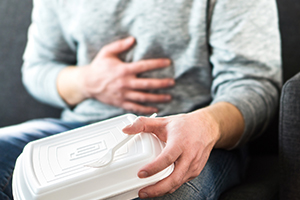
Digestive disorders can be tricky to diagnose, because we have no way to “reset” our digestive systems. They’ve been operating since before we were born, turning nutrients and calories that we consume into essential nutrients and building blocks for our bodies. The digestive system may look simple from the outside—we eat food, it gets processed, and waste is expelled. However, the digestive system is a delicately balanced and complex system of actions and reactions that help our bodies pull the most nutrients from the food we eat to help our bodies function. Gastroparesis is a type of digestive disorder that can make this particularly difficult for the body.
What is Gastroparesis?
Gastroparesis is a disorder in which the normal function of the stomach either takes longer than it should, or the stomach is absent completely. Gastroparesis, literally translated, means “stomach paralysis.” In people without the disorder, the stomach helps to crush the food we eat into pulverized mush, which can move into the small intestine for further digestion. Gastroparesis patients either do not have this ability or their stomach crushes food too slowly or cannot push it into the small intestine. Gastroparesis can be triggered by certain conditions or events, like diabetes, lupus or surgery that affects your digestive tract.
What are the symptoms of gastroparesis?
The main symptoms of gastroparesis are:
• Bloating
• Nausea
• Getting full very early when eating meals
• Heartburn
• Stomach pain
• Nausea or vomiting that intensifies after eating
• Acid reflux
• Excessive burping soon after meals
• Abdominal distension
• Loss of appetite
• Weight loss due to eating too few calories
Some of these symptoms may be very serious, as they can cause dehydration and malnourishment. Repeated presentation of symptoms should be cause for concern—make sure to note any patterns in reactions after eating meals.
What causes gastroparesis and how is it diagnosed?
There are many causes of gastroparesis. Gastroparesis may be caused by diabetes, infections, hypothyroidism, scleroderma, autoimmune disorders, neuromuscular diseases, psychological conditions, eating disorders, cancer, radiation treatment, some chemotherapy treatment, surgery of the digestive tract, and certain medications like narcotics and antidepressants. In addition to a clinical exam and routine lab tests, there are many ways to treat gastroparesis:
• An upper endoscopy is performed by inserting a thin, flexible tube through the mouth and into the stomach. At the end of this tube is a camera that has a live feed to a screen where the doctor can view the upper gastrointestinal tract. A physician or test administrator can view ulcers, inflammation, infection and polyps. Samples may also be taken at this time for biopsy.
• A gastric emptying study examines the rate at which the stomach empties itself. Patients will consume a small meal along with a beverage. The food contains a tiny amount of radioactive material that can be measured by a scan to determine how long it takes the food to leave the stomach.
• Intestinal X-rays can show any blockages that may be present in the stomach or other areas of the digestive tract. An obstruction in the bowels or small intestine can cause gastroparesis-like symptoms.
• GI monitoring system is a fairly new method of diagnosis that is a wireless capsule monitoring system that can be swallowed but not digested. The patient swallows the capsule and the capsule records pH, temperature and pressure changes as it travels through the digestive system. The information is transmitted to a receiver and can tell physicians real-time information about the environment of the digestive system.
How is gastroparesis treated?
There are many methods of treating gastroparesis, including medication and surgery. In the most severe cases, feeding tubes may be required to bypass the stomach directly into the small intestine because the stomach cannot handle anything to maintain proper hydration or nutrition. Medications may be prescribed to reduce nausea and vomiting, and other medications may be prescribed to simulate stomach emptying, encouraging the stomach to do the same.
Once diagnosed, treating gastroparesis is mainly about treating the underlying cause of the disorder rather than covering up symptoms of the disorder itself. Because some foods are more difficult than others to digest, diet is often the first line of defense against gastroparesis.
Is there a best diet for gastroparesis?
There are certain foods that can cause gastroparesis to be worse, or cause intense pain. Foods to avoid if you have gastroparesis are, but not limited to:
• Carbonated beverages
• Alcohol
• Beans
• Legumes
• Seeds and nuts
• Corn
• Broccoli and cauliflower
• Cheese
• Heavy cream
• Excess oil or butter
Foods to eat more of are, but are not limited to:
• Fruit purees
• Vegetable juice, especially those containing spinach, kale and carrots
• Eggs
• Peanut butter
• Bananas
• Breads
• Hot oatmeal
• Crackers
• Fruit juice
Gastroparesis is a serious disorder and should always be diagnosed by a doctor. Stomach pain can be complicated, but if a disorder is affecting your ability to eat normally or affecting your quality of life, a physician can help you figure out the best way to manage the condition.
Disclaimer: The contents of this article, including text and images, are for informational purposes only and do not constitute a medical service. Always seek the advice of a physician or other qualified health professional for medical advice, diagnosis, and treatment.









Leave a reply